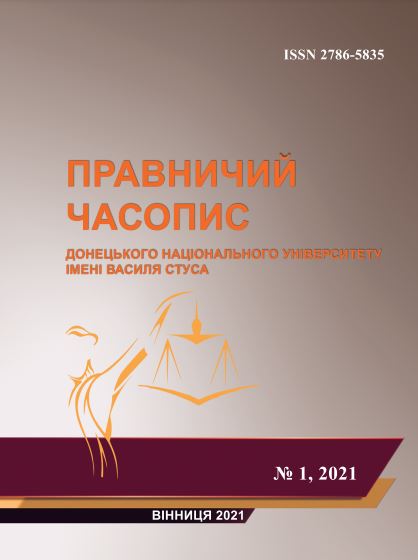Electronic petition as a form of public participation in the exercise of state power: problematic issues
DOI:
https://doi.org/10.31558/2786-5835.2021.1.2Keywords:
democracy; form of public participation; petition; appeal; electronic petitionAbstract
The article considers the electronic form of public participation in Ukraine. The development of information technology provides an opportunity to introduce new forms of human rights. The introduction of wider interaction between public authorities and civil society is an important process of democratization of society. The latest form – electronic petitions – have recently become more relevant.
The democracy of the state is determined by a key factor – the ability of citizens and community members to influence the decisions of authorities at various levels. Electronic petitions are of particular importance to society. Firstly, the amount of support for electronic petitions makes it possible to understand the essence of state problems, to understand the public position on this issue. In this way, a connection is established between the public and government institutions. Secondly, there is communication between all subjects of power, where the people and the citizen feel their real role in the implementation of public authority. Thirdly, the possibility of mistakes and errors by public authorities is eliminated. Fourthly, the legal and legitimate framework for the activities of government institutions is established through public control over their activities. Fifthly, the individual freedom of a person, his / her rights and legitimate interests are actualized, get primary importance. Sixthly, everyone’s participation is available, including inclusive aspects in the authority-public sphere.
Electronic petitions are the latest fast, available, and sometimes even effective form of citizen participation in the exercise of public power. Normative provisions require not only to provide a public authority an answer to a specific issue, but to understand the essence of the problem, to suggest possible solutions, to use the powers to manage the situation in the state-power status. Unfortunately, this is not the case, so electronic petitions remain an ineffective form of public participation in the exercise of public power.
References
Wilding and Laundy. Редліх. Вип. І., 10 вид. С. 493–495.
Третій звіт Спеціального комітету з реформ Палати громад, червень 1985 р., представлений 18 червня 1985 р. Журнали. С. 839.
Лінднер Р., Рім У. Електронні петиції та інституційна модернізація. Міжнародні парламентські системи електронних петицій у порівняльній перспективі. Вересень 2009. JeDEM – електронний журнал електронної демократії та відкритого уряду. 1(1). Р. 1–11.
Пахомова І. А. Концептуальні вимоги до створення електронних петицій Вісник Харківського національного університету імені В. Н. Каразіна. Серія: Право. 2017. Вип. 24. С. 91–93.
Про внесення змін до Закону України «Про звернення громадян» щодо електронного звернення та електронної петиції: закон України від 02.07.2015 № 577-VIII. Відомості Верховної Ради. 2015. № 35, ст. 341.
Порядок розгляду електронної петиції, адресованої Президентові України: затв. Указом Президента України від 28 серпня 2015 р. № 523/2015. Офіційний вісник Президента України від 03.09.2015 р. 2015. № 20. С. 100. Ст. 1222.

